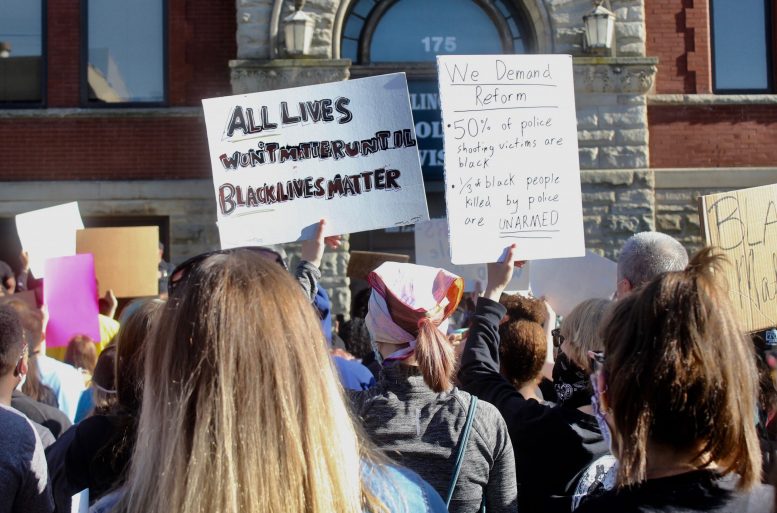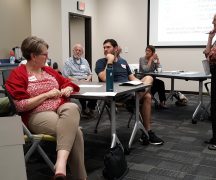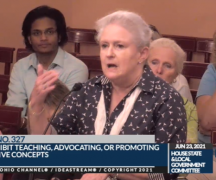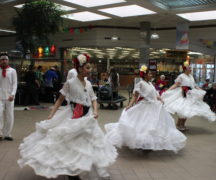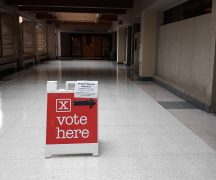By JAN LARSON McLAUGHLIN
BG Independent News
For some white people, racial inequity is a problem of the past.
A member of Not In Our Town shared her experiences Thursday of church meetings she holds weekly in her backyard to have discussions about being a Black person in America.
She told of each week being confronted by one member of the congregation who says, “When are you going to get over this?”
After all, in the past she would not have been able to hold these type of meetings. And years ago, she would not have been able to live on the street where she now resides. These changes are proof that there is no longer racism in America, the man reportedly says each week.
The church meetings, which were intended to be an awakening for white members, have also been an eye opener for the Black woman hosting. Instead of being soothing, she ends up getting angry all over again.
Last week’s Not In Our Town Bowling Green meeting came just days after a BGSU maintenance employee was put on leave after posting threatening racist comments on Facebook. He has since resigned.
BGSU Chief Diversity Officer Jennifer McCary said she was disappointed that the start of the fall semester was marred by the incident. And she reiterated that BGSU is committed to providing a campus where all feel safe.
So, the question of “when are you going to get over this,” may be answered with “when it no longer exists.”
People with privilege often look at the world through different lenses than others, said Ana Brown, director of the Office of Multicultural Affairs at BGSU.
“When we look through our privileged lenses, we see how far we have come,” Brown said. “When we look through our marginalized lenses, we see how far we have to go.”
For that reason, when the Not In Our Town meeting on Thursday reached the “old business” part of the agenda, co-chair Emily Dunipace stressed that racism “is not old business. It’s ongoing business.”
To help nudge Bowling Green toward racial equity, Not In Our Town and the City’s Human Relations Commission, which met Friday, are planning ways to help city residents on their journeys:
- Free Speech vs. Hate Speech panel discussion is planned for Sept. 28, from 6:30 to 8 p.m, as part of an ongoing community learn series. The timing is intentional, right before the presidential election. “This is a contentious time,” Not In Our Town co-chair Dawn Shinew said.
- Race Against Racism, covering 8.46 (the time a police officer kneeled on George Floyd’s neck) kilometers. Details will come later.
- Community Reads program focusing on “So You Want to Talk about Race.” It is hoped that BGSU, the city, the Bowling Green City Schools and Wood County District Public Library will all participate. Three discussion sessions are tentatively planned for Oct. 12, Nov. 9 and Dec. 7, with more details to follow.
- Community drive-in movie, showing “Thirteenth.” The Human Relations Commission members plan to view the movie, which can be found on Netflix, and discuss it at their Oct. 6 meeting.
Bowling Green resident Bruce Jeffers said he has seen Black Lives Matter and “End Racism” signs throughout the county as he campaigns for the election.
“People want Wood County to be better. They want to express their outrage,” Jeffers said.
Dunipace agreed.
“People are ready to do something. For so long, we’ve done nothing,” she said. “Racism is in the forefront of our minds right now – and rightfully so.”
Not In Our Town is committed to working with community partners, Dunipace said.
One of those partners is Bowling Green Police Sgt. Adam Skaff, the division’s new liaison for communities of color. Skaff reported that he has been meeting with several individuals and organizations.
“We’re here to see what the concerns are,” he said. “We’re here to do whatever we can.”
“We’re not going to be perfect,” Skaff said of the police division. “We make mistakes, and we need to be held accountable. We want to make sure this is a great community.”
Another partner is Welcoming BG, led by coordinator Mojabeng Kamala, who reported that international students are really struggling during the coronavirus pandemic. Many lost their jobs, are forced to share housing, and are getting food assistance like macaroni and tuna that they are not accustomed to.
Another partner is BRAVE (Black Rights, Activism, Visibility and Equity).
“It is nice to be in a room full of people with like minds,” Anthony King, of BRAVE, said during the virtual Not In Our Town meeting. “We just want to make BG a more welcoming place for Black people,” where people of color can thrive and have similar experiences as white people.

